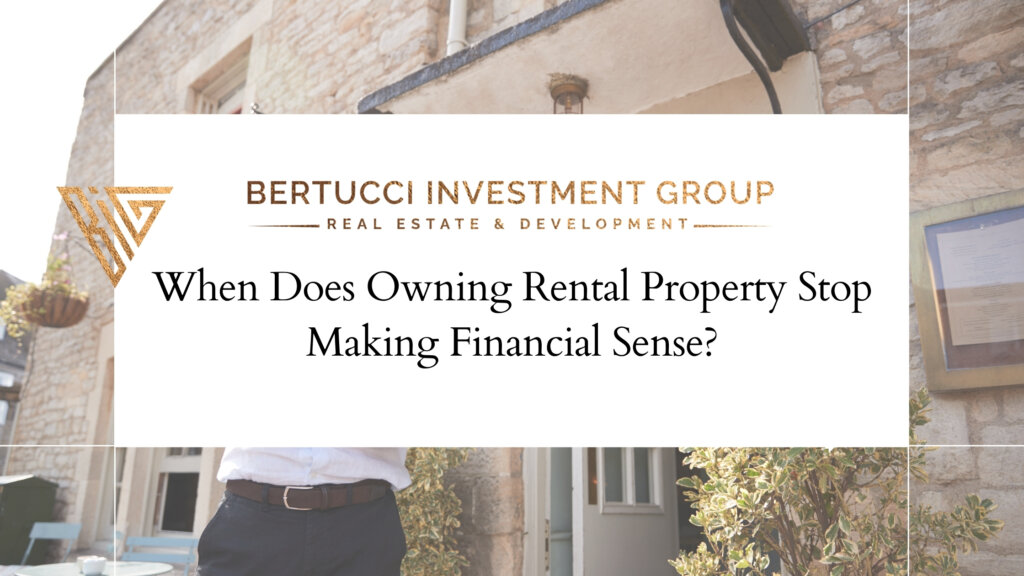
Owning rental property can be a rewarding investment, offering steady income, tax benefits, and long-term wealth. But like any investment, it has its challenges. At some point, many property owners wonder, “When does owning rental property stop making financial sense?” Understanding the factors that influence this turning point can help you determine if it’s time to hold onto your property or explore other options.
In this article, we’ll answer this key question by breaking down the factors that can make rental property ownership more of a financial burden than a benefit. Then, we’ll explain how Bertucci Investment Group can provide a quick, hassle-free solution if you decide it’s time to let go.
1. When Property Expenses Outweigh Rental Income
One of the clearest signs that owning rental property no longer makes financial sense is when your property expenses start exceeding the income you’re generating from rent. Property expenses include mortgage payments, property taxes, insurance, maintenance, repairs, and management fees. Sometimes, rent simply can’t cover these costs, especially if your property is in an area where rents are low, or your mortgage rate is high.
Key signs to consider:
- Low or negative cash flow: If your rental income barely covers your expenses (or doesn’t at all), you may find yourself paying out of pocket to cover costs.
- High maintenance costs: Older properties or those that experience frequent issues, like plumbing or roofing problems, can cost thousands in repairs. These expenses can quickly add up and outweigh any profit you’re making from rent.
2. High Vacancy Rates
High vacancy rates can be another indicator that owning rental property is no longer financially viable. Every month that your rental sits empty, you lose potential income while still having to pay for ongoing expenses. If you’re unable to attract tenants or are constantly dealing with turnover, it might be time to reassess whether owning that property is worth it.
Consider the following questions:
- Is your property in a desirable area? If the location is not appealing, you may struggle to keep tenants long-term, leading to higher vacancy rates.
- Is the rental market saturated? If there are too many rental properties and not enough demand, you may find yourself lowering rents to attract tenants, which can further cut into your profit.
3. Unpredictable Maintenance Costs
Maintenance is a constant responsibility for landlords. While routine maintenance can be budgeted, unforeseen expenses like emergency plumbing repairs, HVAC replacements, or roof damage can quickly become costly. If these expenses are frequent or unpredictable, owning rental property may start to lose its financial appeal.
Red flags for maintenance costs:
- Aging property: Older buildings typically require more upkeep, and these expenses can be substantial.
- Environmental factors: Properties in areas prone to flooding, hurricanes, or extreme weather can incur frequent damage, leading to high repair costs.
4. Changes in the Housing Market
The housing market can influence whether owning rental property remains financially sound. When property values decrease or the rental market becomes less profitable, you may find your investment isn’t providing the returns you expected.
Watch out for these market changes:
- Decreasing property values: If your property is worth less now than when you bought it, selling it might not seem appealing, but continuing to rent it out might also be a losing game.
- Rent restrictions: Some areas have strict rent control laws, which can limit your income potential and make owning rental property less profitable.
- High property taxes: Rising property taxes can significantly impact your expenses, especially if you can’t increase rent to cover them.
5. Difficult Tenants
Even with careful screening, you might end up with tenants who cause more problems than they’re worth. Dealing with late rent payments, property damage, or evictions can turn owning rental property into a stressful experience. The emotional and financial toll of managing difficult tenants can be a major factor in deciding to sell.
Consider the following situations:
- Frequent late payments: If tenants regularly pay late, it can disrupt your cash flow and add stress.
- Property damage: Tenants who don’t respect the property can cause damage that requires costly repairs.
- Legal issues: Eviction processes are time-consuming and expensive. Even after you win an eviction case, you might have to repair the property before renting it out again.
6. Lack of Time or Energy
Being a landlord requires time, energy, and commitment. If you find yourself struggling to keep up with tenant issues, maintenance tasks, or administrative responsibilities, owning rental property may be more trouble than it’s worth. Many landlords start out with high hopes, only to discover that managing a rental property is a full-time job.
Ask yourself:
- Do you have other commitments? If you’re balancing other job responsibilities, family obligations, or personal goals, it might be challenging to manage a property effectively.
- Are you tired of handling it all? If managing a property has become overwhelming or stressful, it might be time to step back and reassess.
7. Diminished Return on Investment (ROI)
Owning a rental property is ultimately about the return on investment. If your property isn’t providing the returns you anticipated, it may be time to consider alternative investment options. A low or negative ROI can indicate that owning rental property is no longer a smart financial move.
Signs of a poor ROI:
- Minimal profit margin: If you’re not making enough profit after all expenses, your ROI may not be worth the effort.
- Better investment opportunities: If other investments, such as stocks, mutual funds, or retirement accounts, offer better returns, it may make sense to sell the property and reallocate your funds.
8. Rising Interest Rates
If you have a mortgage on your rental property, rising interest rates can quickly erode your profits. Higher rates mean higher monthly payments, which can make owning rental property less appealing, especially if you’re struggling to cover expenses.
Key considerations:
- Adjustable-rate mortgage: If you have an adjustable-rate mortgage, rate hikes can lead to higher monthly payments, affecting your cash flow.
- Refinancing challenges: If interest rates are high, refinancing might not be an option, making it harder to lower your payments and maintain profitability.
How Bertucci Investment Group Can Help
If you’re feeling that owning rental property is no longer making financial sense, Bertucci Investment Group can help by offering a quick, stress-free solution. We buy rental properties for cash, allowing you to move on without the hassle of managing a sale. With our streamlined process, you can avoid realtor fees, lengthy listing times, and the costs of preparing your property for the market.
Why Choose Bertucci Investment Group?
- Cash offers: We provide competitive cash offers based on the current market value of your property.
- Quick closings: Our process is designed for speed, so you can close within a timeframe that works for you.
- No repairs needed: You don’t need to worry about costly repairs or upgrades—we buy properties as-is.
- No hidden fees: We’re transparent about our process, so you won’t encounter any hidden costs or commissions.
If owning rental property has become a burden, Bertucci Investment Group can provide a fresh start and financial relief. Contact us today to learn more about how we can help you move forward.
Whether you’re struggling with expenses, challenging tenants, or market shifts, there comes a point when owning rental property stops making financial sense. Evaluating these factors can help you decide whether it’s time to sell or hold on. If selling seems like the right option, Bertucci Investment Group is here to help make that transition as smooth as possible. Contact us through the form below or call (504) 920-4747 to get a no obligation cash offer in the next 24 hours!
